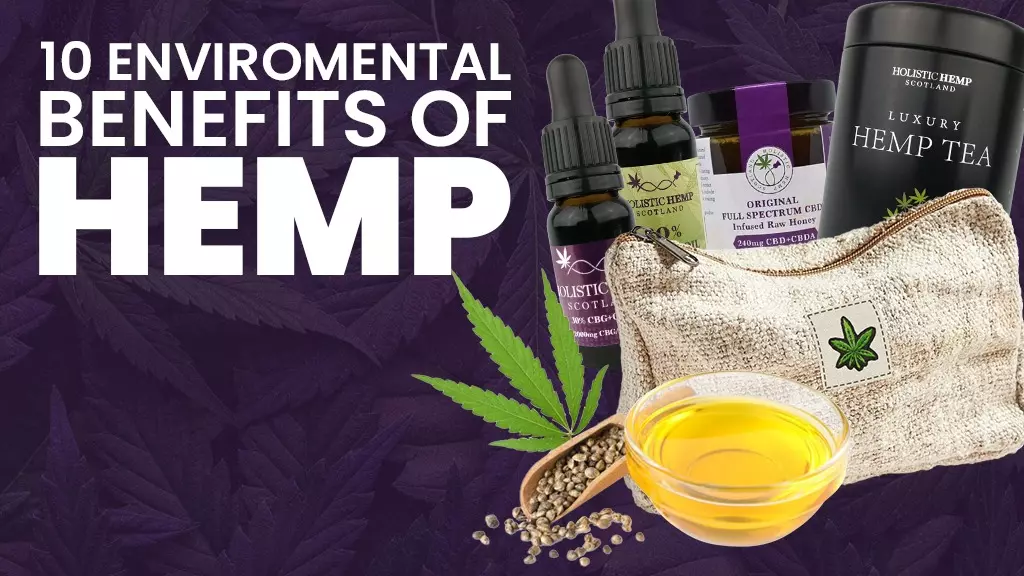Recent Posts
Post Catagories

All of Holistic Hemp Scotland’s CBD products are derived from hemp, but did you know that hemp has many other uses? Hemp is a natural environmental warrior, offering amazing benefits in its plant form as well as the sustainable goods it can become. Ten of hemp’s most astounding environmental benefits are discussed in this article.
1. Soil And Water Regeneration And Purification
Hemp has several environmental benefits for the soil in which it is planted. It can naturally fix nitrogen in the soil, for instance. In addition to promoting natural soil fertility, this lessens the demand for synthetic fertilizers. Compacted soil can be broken up and given more air by the deep roots of hemp. This encourages water retention, which lessens soil erosion. Furthermore, hemp can refill soil and water with nutrients by eliminating pollutants, contaminants, and even heavy metals. Indeed, heavy metals and radioactive elements were extracted from the soil and ground waters as part of the cleanup operations following the Chernobyl tragedy.
2. Habitat And Food Source For Wildlife
Many different kinds of animals, such as insects, birds, and small mammals, can be found living in and feeding from hemp fields. For instance, when other flowers have finished blooming and pollen sources are few, bees can utilize hemp as a late-season pollen source to feed their larvae. Hemp also helps birds because they can use the plants as refuge and the seeds as food. Additionally, since hemp doesn’t require toxic chemicals like pesticides and herbicides, which would affect biodiversity, it can be produced without them.
3. Drought Resistance
Being a resilient and versatile crop, hemp can grow in a variety of habitats and climates. This covers both semi-arid and arid zones, thus in drought-prone areas, it can be a great alternative for agricultural. Not only does it require a lot less water than most other kinds of crops. Because of this, it’s a very sustainable option that conserves natural resources, especially in regions where drought is a typical occurrence.
4. Low Chemical Maintenance
Hemp possesses an innate resistance to numerous pests and illnesses that can negatively impact other crops. This indicates that it can grow with very little, if any, synthetic pesticide application. Because of its previously mentioned propensity to fix nitrogen in the soil, it also typically requires less fertilizer than other crops. Pollution and resource consumption are decreased as a result of this minimal chemical upkeep. Not only that, but many hemp products—including ours—are organic because hemp can grow without harmful chemicals.
5. Carbon Negative Plant And Products
Growing, hemp plants take up a lot of carbon dioxide (CO2) from the environment. Based on recent studies, hemp is able to absorb carbon from the atmosphere more efficiently than forests. It is actually a carbon negative crop because during its growth it absorbs more carbon dioxide than the machinery that harvests, processes, and transports it releases. By storing carbon, we can lessen the effects of climate change. Furthermore, hemp-based goods have the ability to absorb more CO2 during manufacture than they release, including building and manufacturing materials like hempcrete and bioplastics. This suggests that hemp is carbon neutral outside of its basic plant form as well.
6. Reduced Plastic Pollution
Textiles and containers made from hemp fibers and components biodegrade. This indicates that, compared to their synthetic counterparts, they have a smaller environmental impact at the end of their life cycle. For instance, bioplastics made from hemp provide a biodegradable substitute for traditional plastic. By doing this, the pervasive problem of plastic pollution in landfills and natural areas like the ocean is lessened.
7. Renewable Energy Source
Ethanol and biodiesel are two biofuels that can be made from hemp biomass. Since hemp-based biofuels release fewer greenhouse gases and other dangerous pollutants into the atmosphere than fossil fuels, this provides a sustainable and renewable fuel substitute. Indeed, Henry Ford developed an car using bioplastics generated from hemp in 1941, and it was intended to run on hemp biofuel.
8. Reduced Deforestation
Deforestation is the process of removing large tracts of trees for harvesting, which includes making paper. Hemp can significantly lessen the problem of deforestation because it can be used to replace wood in the paper-making process for many different kinds of paper products. To its environmental benefits, it also doesn’t need to be bleached. Not only that, but hemp grows remarkably fast—it can be completely grown in three to four months—making it a practical substitute that won’t cause major supply problems.
Crop Rotation Benefits
Hemp can be incorporated by farmers into their crop rotation plans. As a result, it can disrupt the life cycles of dangerous pests and illnesses and enhance soil health. Hemp will have sufficiently cleaned up the soil and environment when the next crops are planted, preventing them from succumbing to typical agricultural problems. Furthermore, hemp has the ability to suffocate weeds as it develops. In addition to lowering the demand for synthetics and chemicals, using hemp during a crop rotation helps to create a more sustainable farming environment.
10. Circular Economy
A resource production and consumption paradigm centered on sustainability, reuse, recycling, and waste reduction—ideally waste elimination—is known as a circular economy. In several industries, hemp helps create reusable and biodegradable products, which advances the circular economy. The waste cycle can be fully closed by reusing, composting, and returning these biodegradable goods, materials, and resources back into the earth from which they came. Furthermore, there is a purpose for every part of the hemp plant, including the flowers, leaves, stalks, and seeds. This further supports the circular economy because the hemp plant does not naturally produce any waste.
Final Thoughts On The Environmental Benefits Of Hemp
A renewable energy source, hemp offers a vast array of advantages to people, pets, and the ecosystem. Although many of the most amazing environmental advantages of hemp are covered in this list, it is by no means all-inclusive. It seems that hemp can do no wrong in the world, whether it is used as an organic plant or to make any of the numerous biodegradable goods and materials it may be used to.

